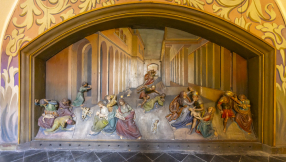
Easter is a season of hope, a reminder that in Jesus God is 'making all things new'. Rarely in my ministry has this felt more important, as millions of families have struggled to make it through the winter in the face of the devastating Cost of Living Crisis.
In this light, as we leave the cold and dark of this last season behind, it might be tempting to bid a hearty good riddance to what has been a novel and striking feature of British life in the past few months, namely the rise of so-called 'Warm Spaces'. These have received over a million visits from those struggling to heat their homes this winter.
For many people the sight of churches, libraries and other community settings offering places of warmth to those struggling to heat their own homes perfectly encapsulates the struggles that we, as a country face. Last year, in the face of the global gas price surge caused by the war in Ukraine, it was hard to understand why political leaders failed to heed the loud warnings being made by figures like Martin Lewis and Gordon Brown of imminent destitution for millions of households.
As the Chair of the ChurchWorks Commission which established the Warm Welcome campaign to support community groups to set up and run Warm Spaces, it was striking how many media requests we received from international outlets who had clearly decided that this development was an important next step in the narrative of the state of Britain.
We might be tempted therefore to want to turn the page on Warm Spaces and not dwell on what has been an incredibly challenging season for so many. Yet there is another side to the Warm Space story, and it's a side that deserves careful reflection from Christians in particular who want to be attentive to what God is doing in and through the Church. For what we have witnessed in the Warm Welcome campaign is a truly remarkable demonstration that the Church, for all its flaws and failures, can still be the site of extraordinary transformation for people and communities.
Assembled at break-neck speed last autumn, Warm Welcome has been driven by a coalition of churches and charitable organisations all seeking to support authentic local responses to the cost of living crisis. With an open brand and a low bar to entry (Warm Welcome Spaces simply have to be free to enter, warm, welcoming and safe), the campaign saw thousands of churches from across the UK sign up and register themselves on a national online map in a matter of just a few weeks.
For a significant number of these, Warm Welcome provided a banner under which to grow and expand their existing activities – extending hours, running new sessions, reaching new parts of the community. For others it has been a catalyst to try something new – film nights, homework clubs, community meals. In many places this has involved churches working together in villages, towns and cities, sharing resources and ensuring that people have access to support as often as possible throughout the week. Many have learned new ways of cooperating with local authorities and other community groups as well.
Though the content of this work has hardly been revolutionary, the impact of these Warm Welcome Spaces has been extraordinary. With Spaces collectively welcoming up to 100,000 people each week, Warm Welcome has been inundated with stories of people finding not just places of warmth but of connection and meaning. Sixty per cent of attendees said that coming to the Space had helped them financially, with over two thirds of those saving on energy bills and more than 40% saving on food costs.
Even more striking has been the impact on loneliness and wellbeing. When asked how often they felt lonely before coming to their local Warm Space, 38% of people said 'always' or 'often'. That number dropped to just 6% since coming. And when asked about feeling purposeful, respondents that always or often felt they led meaningful lives increased from a third to over half. Of course behind each of these numbers are the stories of individuals who are infinitely precious to God. And as one Warm Space attendee starkly shared, "If I didn't come here I would have killed myself and now I look forward to coming and seeing people who care about me."
As a bishop, one of the most exciting things about the Warm Welcome campaign is not just the extraordinary human impact on those coming to the Spaces, but also the clear signs of institutional renewal as local churches have seized the opportunity to build new connections and put themselves ever more firmly at the heart of their local communities.
For many churches, Warm Welcome has provided an opportunity to rediscover the value of their building and of physical connection after the dislocation of the Covid pandemic. Ninety-seven per cent of Warm Space attendees say they want to remain connected to the Space beyond the winter, so churches find themselves with a hugely exciting opportunity for ongoing witness and discipleship.
So whilst some may see Warm Spaces as an emblem of national decline, those with the eye of faith might discern something altogether different and more heartening. It may not be flashy, and it may not involve all-night worship sessions and dramatic miracles. But Warm Welcome might just, in a very British way, be a form of revival for the Church in the UK. This is something to celebrate, to pray for, and to build upon as we enter Spring and beyond.
The Rt Rev Paul Butler is Bishop of Durham and Chair of ChurchWorks, creator of the Warm Welcome Spaces campaign.













